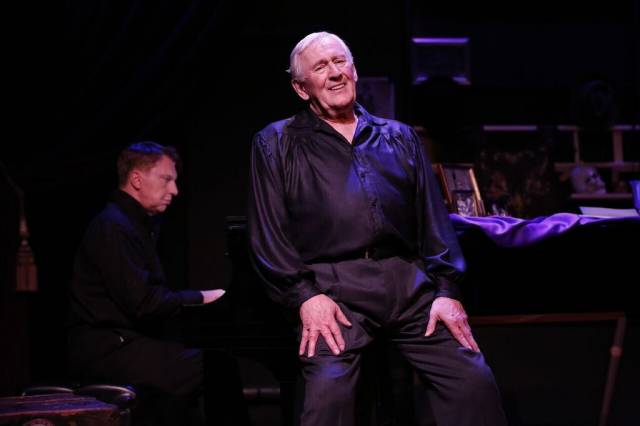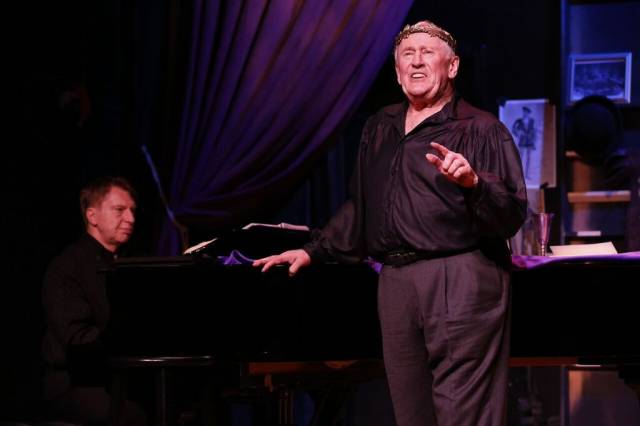

Tony-winner Len Cariou is the rare actor who has mastered both Shakespeare and Sondheim, his love for musical theatre and the Bard coming together in a delightful show titled Broadway and the Bard, which sees Cariou pair his favorite soliloquies from works like King Lear, with show tunes that touch on similar themes, or that contrast with the text. During the show he recounts some anecdotes about working on Applause, and his current work on television. Cariou’s boundless energy makes the show essential for musical lovers, Shakespeare fanatics and everyone in between, as he breathes new life into pieces we only thought we knew all too well. I had the opportunity to speak to the legendary artist about his love for the Bard, working on movie versions of Broadway shows, and his brilliant supporting role in the Oscar nominated Spotlight.
Love for Shakespeare doesn’t really come naturally to people. Do you remember when you first learned to like Shakespeare?
No it doesn’t, like most people I studied him in school before I was ever an actor. When I became an actor I read Shakespeare and thought I didn’t know what I would play in a Shakespeare play except maybe Romeo, maybe Prince Hal in Henry IV, or younger guys because I was thinking about my own life. Otherwise Mr. Shakespeare doesn’t give you a lot of tips as to age wise and what that should be.
It was a little daunting if you will, but when I first went to Stratford, Ontario in the early 60s, I was exposed to nothing but Shakespeare for five plays which we did in rep. Because I didn’t know the Shakespeare canon at all, I sat down on every rehearsal to learn a few things, and I think it was one of the wisest things I ever did. I watched these very skilled actors who’d been doing it for most of their adult lives, and I realized they were translating the Elizabethan text so it would fall in a modern ear. They were phrasing it in a way that a contemporary ear would by inflection, pause and indication, be able to interpret the language a little better, because many of those words are foreign to our ears.
My mentor at the time was John Hirsch, who founded the Manitoba Theatre Centre in Winnipeg and took me under his wing. He engineered me going to Stratford to expose me to the classics, and after my first year there I came back to him and said “that’s what I wanna do, I wanna make a career out of the classics”. He said to me “you’re taking the high road, I’m with you all the way, but promise you won’t relinquish doing musicals because there’s not an awful lot of actors who can sing and dance at the same time”. So I promised him that.
I like that you brought up that because there’s a certain musicality to Shakespeare, and one of the biggest tragedies is having someone not so good do the Bard, because you can’t hear the music…
Exactly.
Was it easy for you to pair the text and the music for the show?
The whole thing started really in 1969 when I did Henry V and Applause in New York. I kept getting work and the idea was always there, but I kept working - a nice problem to have - and then once I got into Blue Bloods I missed singing, so I went back to my voice teacher, Mark Planner, and told him I missed studying with him, that was about five years ago, and after two years I told him I wanted to go back to my origins which was singing in nightclubs, cabaret as they call it now. I put together a cabaret show which I did at 54 Below, and then this idea came back to me. I thought I could do it in a cabaret setting, but realized it would work better as a theatre piece. I picked most of the soliloquies that I wanted to do, and my music director Mark Janas, and I had a lot of the songs we needed. When we hit a wall I went to Barry Kleinbort, and asked him if he was interested because he’s a composer, lyricist and director. The three of us started to apply ourselves, we first did a 20 minute version, then a 40 minute version and we figured in order to make it an evening we needed it to be at least 75 minutes. So we added more soliloquies and music.
By the time you did Applause you probably had seen All About Eve a few times, so you were familiar with how a movie becomes a musical. But you also went through the other side of the process when you did the movie version of A Little Night Music, after you’d done it on Broadway. How were this processes?
It was very exciting! The interesting part for me about making the film of A Little Night Music, was that unfortunately critics wanted Mr. Prince to remake Smiles of a Summer Night, and that wasn’t what it was about. Everyone was also waiting to criticize Elizabeth Taylor because she was not very popular at the time, but I thought she was brilliant casting for Desiree. I don’t think the film got is real just due.
The process of turning the stage version into a film was really interesting. I had to be very careful because of course the camera does a lot of work for you, but it was something I enjoyed doing because of that challenge, and because Hal Prince who directed both, and Stephen were there to monitor me. I asked them both not to let me go over the top, and for the most part I think we achieved that.
Being so familiar with the piece was it hard to come to terms with the fact that once it was on film it would be set forever?
The thing about film is that you could do the same scene all day, and redo it and redo it until you get it right. Because of the nature of actors redoing it several times can make it worse. In rehearsal that’s what you do, you try different angles, different thoughts behind it to correct it. But sometimes on film with an entire crew standing around while you’re figuring out what to do, you can get a little nervous, or uptight and it can go south on you. Not that that happened in Music, but it can happen sometimes.
I heard you sing “Send in the Clowns” at a concert at NJPAC where you mentioned the song was originally meant for your character, and then Sondheim gave it to Desiree. How was it to get to perform the song?
It was a true deal, hearing the lyric from a male perspective was interesting to do. The song is wonderful anyway, I remember when we made the recording in New York, after we’d opened the show, Goddard Lieberson, who really created the show album came to our recording dates and when Glynis Johns was singing it in the recording studio she was terribly nervous because it would be there forever. I happened to be with her because after she did “Send in the Clowns”, we were going to do the reprise, and Lieberson was in the control booth, after she sang it the first time he came to the mic, instead of Hal Prince or Stephen Sondheim, and said “Glynis, this is Goddard Lieberson, that was very interesting but I have a note that I would love to give you if you don’t mind”, she said OK, so he came in and he said “Glynis, ‘Send in the Clowns’ is a torch song” and she said “oh”. He turned around and walked out, she re-recorded it as a torch song, what he told her really spoke to her. Not to be sentimental in any way, that stuck in my head. It is a torch song, men and women can sing torch songs, Sinatra recorded it at one point.

You are so familiar with Sondheim’s work having done two of his greatest pieces, that I have to wonder if there are any other of his characters you’d like to play.
Pretty much I had the blessings from the gods to do those two original pieces, and I don’t think anything since then that he’s written is really something that I would do.
As you enter a part of your career where you’re playing venerated authority figures, like in Blue Bloods, or Cardinal Law in Spotlight, who is also kinda scary, do you crave for another villainous character like Sweeney Todd?
Oh yeah, they’re great fun to play! Just on film it would be fun to have some more scenes where you could show your villainy, but I think one of the great ideas [director] Tom McCarthy had about Cardinal Law was he told me “don’t make it the villain”. As you know having seen Spotlight, there are really no villains, the press people in any case were as much villains as Law was because they buried the story for a decade. That’s what I think was really special about Spotlight, there were no villains, and god knows Law wasn’t the only priest or cardinal in the world who was doing this. There are documentaries available that trace all of this back to the Vatican and the Pope. The Pope was complicit in this.
You played God once, in Up from Paradise…
Oh, god...
If you were God and could change a few things what would they be?
(Laughs) Get serious, that’s a tough question to ask a guy. If I were God what I’d do is shorten the debates for the presidency, we’ve been listening to this garbage for the last two years. We needed to listen to it for the last few weeks, but unfortunately the system is so that we’re obliged to listen to this, even if you don’t watch them they’re all over the news.
Broadway and the Bard is now playing.